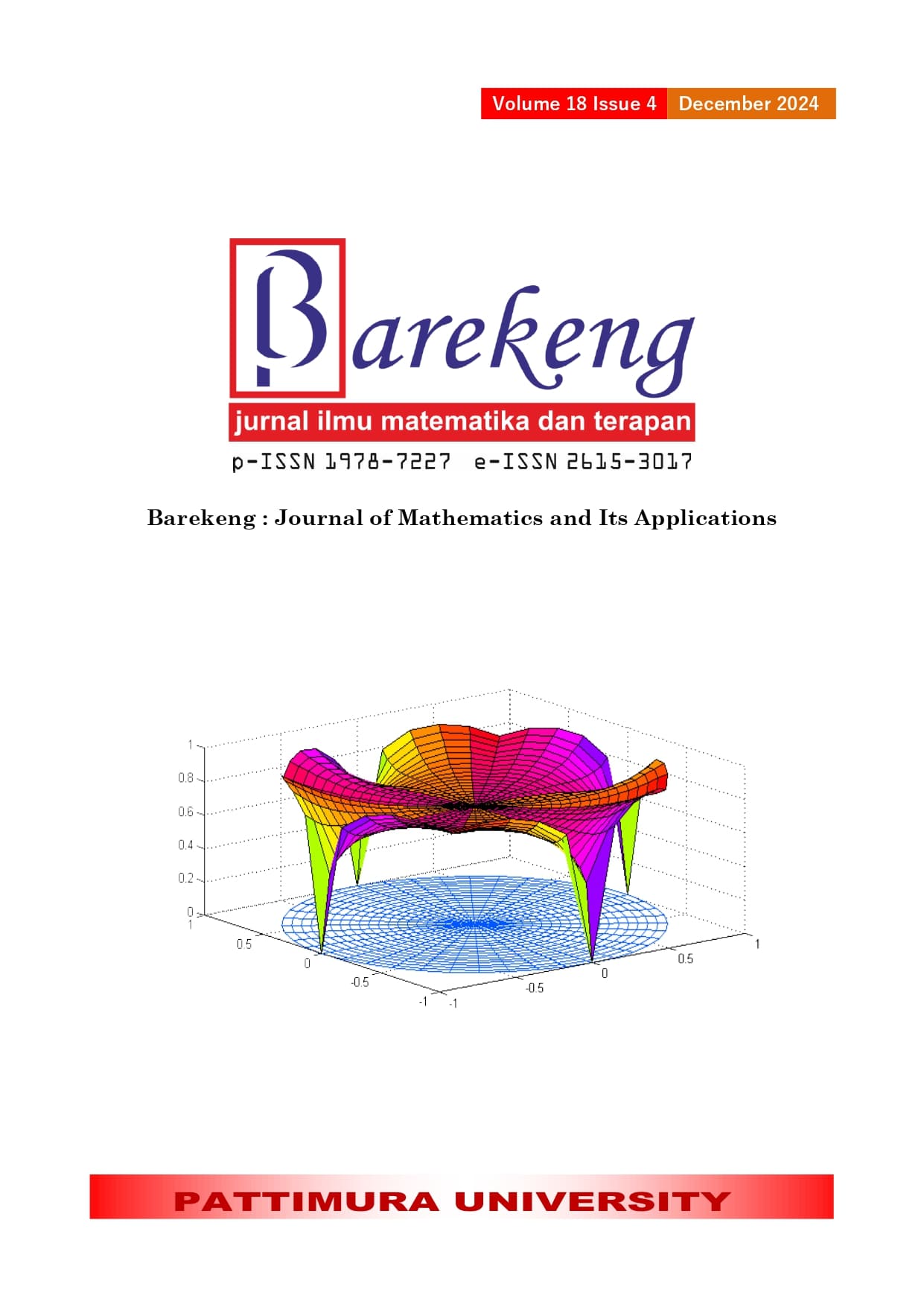ADDITIVE HOLT-WINTERS METHOD FOR FORECASTING GROSS REGIONAL DOMESTIC PRODUCT AT CONSTANT PRICES OF EXPENDITURE OF WEST SUMATRA
Abstract
Regional disparities often pose significant challenges, with some areas experiencing rapid economic growth while others lag behind. An essential macro benchmark to gauge the success of development initiatives is economic growth, as indicated by changes in a region's Gross Regional Domestic Product (GRDP). Using GRDP at constant prices (GRDP CP) helps eliminate the impact of price fluctuations, focusing on real increases in production activities. Expenditure GRDP reflects the value of goods and services produced within a region and consumed by the community. In the case of West Sumatra, the GRDP CP expenditure data reveals simultaneous seasonal and trend elements. The seasonal pattern, occurring quarterly each year, exhibits an additive seasonal effect. The Additive Holt-Winters method has been proven effective for data containing seasonal patterns with constant seasonal variation (additive) and linear trends, where the level, trend, and seasonal pattern can change. The data used is secondary data of GRDP CP of expenditure quarterly of West Sumatra in 2010 - 2022 obtained from the official website of the Indonesian Central Bureau of Statistics. According to research findings, the GRDP CP expenditure with a Mean Absolute Percentage Error (MAPE) value of 1.03% for quarter I to quarter IV in 2023 are Rp46,284,010.59, Rp46,472,223.99, Rp47,512,197.79, and Rp48,445,184.94, respectively. This suggests that the model equation performs exceptionally well predicting future economic trends.
Downloads
References
K Mudrajad, “Otonomi dan pembangunan daerah: Reformasi, perencanaan, strategi dan peluang,” 2004.
P. Romhadhoni, D. Z. Faizah, and N. Afifah, “Pengaruh Produk Domestik Regional Bruto (PDRB) Daerah terhadap Pertumbuhan Ekonomi dan Tingkat Pengangguran Terbuka di Provinsi DKI Jakarta,” Jurnal Matematika Integratif, vol. 14, no. 2, p. 113, 2019.
Sjafrizal, Perencanaan pembangunan daerah dalam era otonomi. PT RajaGrafindo Persada, 2014.
Tim Badan Pusat Statistik Provinsi Sumatera Barat, Produk Domestik Regional Bruto Provinsi Sumatera Barat Menurut Pengeluaran 2018-2022. Padang: Badan Pusat Statistik Provinsi Sumatera Barat, 2023.
C Lidiema, “Modelling and forecasting inflation rate in Kenya using SARIMA and Holt-Winters triple exponential smoothing,” American Journal of Theoretical and Applied Statistics, vol. 6, no. 3, pp. 161–169, 2017.
D. C. Montgomery, C. L. Jennings, and M. Kulahci, Introduction to time series analysis and forecasting. John Wiley & Sons, 2015.
J. A. Nursiyono, Kompas Survei Ubinan. Deepublish, 2015.
D. Rosadi, “Analisis Ekonometrika & Runtun Waktu Terapan Dengan R, Aplikasi untuk Bidang Ekonomi, Bisnis, dan Keuangan,” Yogyakarta: CV Andi Offset, 2011.
Sjafrizal, Analisis ekonomi regional dan penerapannya di Indonesia. Rajawali Press, 2018.
M. Kuncoro, Perencanaan daerah: bagaimana membangun ekonomi lokal, kota, dan kawasan? Salemba Empat, 2012.
N. P. Dewi and I. Listiowarni, “Implementasi Holt-Winters Exponential Smoothing untuk Peramalan Harga Bahan Pangan di Kabupaten Pamekasan,” Digital Zone: Jurnal Teknologi Informasi dan Komunikasi, vol. 11, no. 2, pp. 219–231, 2020.
Nunik Parwati, “Prakiraan Jumlah Penumpang menggunakan Exponential Smoothing Holt Winters (Studi Kasus: Jumlah Penumpang Keberangkatan pada Penerbangan Internasional di Bandar Udara Soekarno Hatta Pada Januari 2006 – Desember 2018),” UIN Syarif Hidayatullah Jakarta, Tangerang Selatan, 2020.
A. Nawawi, S. Herawati, and N. Prastiti, “Implementasi metode holt winter additive untuk prediksi kunjungan wisatawan nusantara kabupaten sumenep,” Jurnal SimanteC, vol. 10, no. 1, pp. 25–30, 2021.
Tim Badan Pusat Statistik Kabupaten Dharmasraya, Produk Domestik Regional Bruto Kabupaten Dharmasraya Menurut Pengeluaran 2013 – 2017. Dharmasraya: Badan Pusat Statistik Kabupaten Dharmasraya, 2018.
S. Wheelwright, S. Makridakis, and R. J. Hyndman, Forecasting: methods and applications. John Wiley & Sons, 1998.
I. Djakaria and S. E. Saleh, “Covid-19 forecast using Holt-Winters exponential smoothing,” in Journal of physics: conference series, IOP Publishing, 2021, p. 012033.
G. Tirkes, C. Guray, and N. Celebi, “Demand forecasting: a comparison between the Holt-Winters, trend analysis and decomposition models,” Tehnicki Vjesnik-Technical Gazette, vol. 24, 2017.
G. A. N. Pongdatu and Y. H. Putra, “Seasonal time series forecasting using sarima and holt winter’s exponential smoothing,” in IOP Conference Series: Materials Science and Engineering, IOP Publishing, 2018, p. 012153.
J. Mladenović, V. Lepojević, and V. Janković-Milić, “Modelling and prognosis of the export of the Republic of Serbia by using seasonal Holt-Winters and ARIMA method,” Economic Themes, vol. 54, no. 2, pp. 233–260, 2016.
R. A. Nisyah, N. Hidayat, and A. A. Supianto, “Peramalan Hasil Penjualan Perhiasan Emas Menggunakan Metode Exponential Smoothing (Studi Kasus: Toko Emas Rejeki Baru Sumenep),” Jurnal Pengembangan Teknologi Informasi dan Ilmu Komputer, vol. 3, no. 7, pp. 7268–7274, 2019.
L. S. Lasdon, A. D. Waren, A. Jain, and M. Ratner, “Design and testing of a generalized reduced gradient code for nonlinear programming,” ACM Transactions on Mathematical Software (TOMS), vol. 4, no. 1, pp. 34–50, 1978.
Copyright (c) 2024 Lathifah Lathifah, Dina Agustina

This work is licensed under a Creative Commons Attribution-ShareAlike 4.0 International License.
Authors who publish with this Journal agree to the following terms:
- Author retain copyright and grant the journal right of first publication with the work simultaneously licensed under a creative commons attribution license that allow others to share the work within an acknowledgement of the work’s authorship and initial publication of this journal.
- Authors are able to enter into separate, additional contractual arrangement for the non-exclusive distribution of the journal’s published version of the work (e.g. acknowledgement of its initial publication in this journal).
- Authors are permitted and encouraged to post their work online (e.g. in institutional repositories or on their websites) prior to and during the submission process, as it can lead to productive exchanges, as well as earlier and greater citation of published works.






1.gif)



